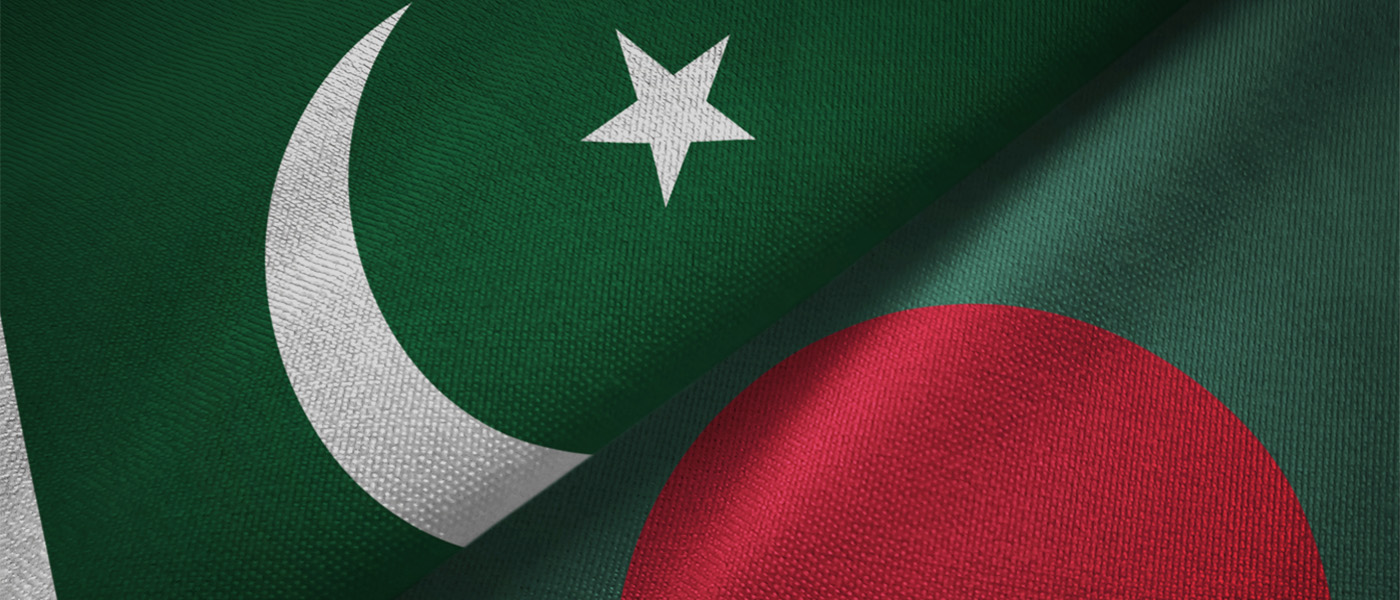Religion, history, culture and geographical proximity are the factors that can either enhance or suppress the bilateral ties between two countries. In case of bilateral ties of Pakistan and Bangladesh, all these factors have played their role very well. For many years, the hurdle in establishment of warm bilateral ties between Pakistan and Bangladesh is the “history” factor. The worse part about this history factor is that it has successfully dominated the other two factors i.e. regional proximity and religion and has been suppressing the potential that lies in bilateral ties of both states since the creation of Bangladesh. The nightmare of common history of Pakistan and Bangladesh i.e., the 1971 war, which led to the creation of Bangladesh, is the main building block ofthis history factor. The narratives of 1971 war, often linked with Pakistan’s (West Pakistan) violence and Bangladesh’s (East Pakistan) suffering haven’t lost their essence until now. However, recent few years are evident of the melting of ice between two south Asian states.
The year 2020, proved a turning point in the history of Pak-Bangladesh bilateral ties. One can’t deny the efforts put by Imran Khan to soften the ties with Bangladesh. Khan, the former PM of Pakistan, took more of a diplomatic approach for strengthening relationship. On Bangladesh’s 50th Independence Day, he congratulated Bangladesh’s PM, Sheikh Hasina and also invited her to visit Pakistan. Dhaka replied in quite optimistic way and acknowledged the Khan’s gesture and highlighted that Bangladesh “do support” cooperation and peaceful relations with neighbors. The telephonic conversation between both leaders was also observed in this era. In the same year i.e., in 2020, appointment of Pakistan’s envoy Imran Ahmed Siddiqui to Bangladesh, followed by meeting of Islamabad’s envoy and Dhaka’s Foreign Minister was the major advancement in melting of ice. Although in reign of Imran Khan, Pakistan and Bangladesh were all good to take a fresh start, nevertheless there came some hurdles along the way. Among those hurdles were the Indian factor -accusing Pakistan of taking advantage of Indian preoccupation with other issues- and a random nationalist wave in Dhaka, insisting Pakistan for formal apology for genocide it committed in 1971 war. Fortunately, regional politics took its part and proved to be favorable for both states to enhance their relationships. The twist that lies in regional politics of that era is that it made environment favorable for Pak-Bangladesh and proved unfavorable for India-Bangladesh ties. China’s offer to Bangladesh for trade with zero tariffs, Bangladesh’s neutrality in Indian-China conflict and rise of Anti-Indian protest in Dhaka (due to passing Citizen Amendment Act CAA in India) were fuel to this suppression in India-Bangladesh ties. This was quite helpful to undermine hurdles in the way of bilateral ties including Indian factor but the Dhaka’s urge for “formal apology “has still a long way to go and has not lost its momentum in current times too.
Coming back towards the history to link it with the current times but in more of a general way. Pakistan’s political history is compatible with the fact that change in governance brought alternation in policies opted by previous government. Thus, policies, situations, promises, efforts and processes lack continuity in Pakistan. Same is the case with policies adopted in Khan’s era. In 2022, after the success of no confidence movement, coalition government came into being, appointing Shahbaz Sharif as a prime minister. Sharif, while addressing to ceremony in Islamabad, showed interest in strengthening bilateral ties with Bangladesh. Although in 2010, being a Chief minister Shahbaz Sharif participated in strengthening bilateral ties with Bangladesh by hosting 10-member media delegation from Bangladesh but being a PM, Sharif haven’t taken any concreate step to ensure continuity of efforts made in Khan’s era. Thus future of Pakistan-Bangladesh ties is seen to be quite uncertain in Sharif administration.
Michael Kugelman, a South Asian expert stated that, “Economic cooperation is a logical space for step-up collaboration for countries.” Bilateral trade and economic cooperation is a key for improvement and perseverance of bilateral ties with Bangladesh. Bilateral trade between both states lacks any pattern (increasing or decreasing pattern) but according to UN COMTRADE database, the year 2021 witnessed that Pakistan’s exports to Bangladesh was US$813.22 million dollars, which suggests that trade between both states is gradually increasing and is a good sign for Pakistan who is struggling to enhance relationship by enhancing trade. Meanwhile, Bangladesh exports to Pakistan is far bigger than Pakistan’s, due to which Pakistan experienced surplus of 46% in financial year (2021-22). In order to ensure continuity in bilateral trade, Pakistan need to address this trade imbalance and should formulate policies to deal with trade surplus issue to avoid any unpleasant happening in near future.
Finding common grounds for cooperation and utilizing them for state’s prosperity, is the way by which states can enhance their bilateral ties. Beside of cruel past, Pakistan and Bangladesh have too much in common. Both of the states have same religion and somehow same cultural values. Both are agricultural countries. They are included in the top 10 most populous countries in the world and make up about 5% of whole world’s population. Currently, both states are facing realities of climate change in the form of increased floods, droughts and water scarcity. These similarities have far more potential for cooperation than the clashes or conflicts they might have between them.
For future course of action, religious tourism and public diplomacy are some of ways to enhance the people to people contact that might help in changing narratives that 1971 conflict has left behind in the minds of public of both states. The increased brotherhood between both countries would benefit commercial exchange, which will be paved ways towards improvement of bilateral trade and ties. And last but not the least, the demand for apology both states must overlook the past and restart fresh, if they intend to pursue long term cordial bilateral ties.
The writer is currently studying at Fatima Jinnah Women University (FJWU), Rawalpindi.


